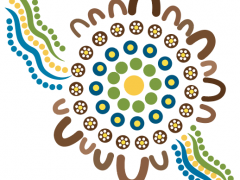 Scoping Culturally Responsive Models of Care for Pancreatic Cancer
Scoping Culturally Responsive Models of Care for Pancreatic Cancer
Scoping culturally responsive models of care for Aboriginal and Torres Strait Islander people with complex cancer
This Cancer Australia,will consider culturally responsive models of care for Aboriginal and Torres Strait Islander people with pancreatic cancer, upper gastrointestinal cancer and other complex cancers.
Our work involves a review of existing literature to identify existing models of care and consultation with key stakeholders to discuss the feasibility of various models for Aboriginal and Torres Strait Islander people. Recommendations will be made to Cancer Australia on potential opportunities to improve the cultural responsiveness of care for pancreatic and upper GI cancers in the short and longer term.
Funding:
This project is funded by Cancer Australia and is led by Dr Abbey Diaz.
Artwork:
Created by Craig Carson, Wakka Wakka, Cobble Cobble.
The Central Circle – The Body
At the center of the canvas is a circle, representing the pancreas — deep inside the body, unseen but vital.
The inner circle is green and dark blue, the hidden nature of pancreatic cancer.
Around it, small white and yellow dots represent cells, medicines. Around the outside are symbols representing people, the community and the spiritual energy of healing.Wavy travel lines stretch from the center outward in two directions — symbolizing the journey of the patient and the care they receive.
 Fear of cancer recurrence among Aboriginal and Torres Strait Islander women diagnosed with breast cancer
Fear of cancer recurrence among Aboriginal and Torres Strait Islander women diagnosed with breast cancer
This project aims to identify the prevalence of fear of cancer recurrence among Aboriginal and Torres Strait Islander women with breast cancer and identify appropriate models of care. This project is being conducted in collaboration with Breast Cancer Network Australia and colleagues from the University of New South Wales.
 Co-Design in Health with First Nations People
Co-Design in Health with First Nations People
Key principles and best practices for co-design in health with Aboriginal and Torres Strait Islander peoples: Toolkit development
Our team has been contracted by Cancer Australia to develop a set of key principles and best practices in undertaking co-design with First Nations peoples in Australia relevant to the cancer control context. The project will provide Cancer Australia with leadership and strategic advice on developing a toolkit to help implement the principles of co-design into practice.
Artwork:
Created by Craig Carson - Wakka Wakka, Cobble Cobble.
 Improving Gynaecological Cancer Outcomes
Improving Gynaecological Cancer Outcomes
for Aboriginal and Torres Strait Islander women in Queensland
Aboriginal and Torres Strait Islander women have higher gynaecological cancer incidence and mortality rates compared to non-Indigenous women. Comprehensive, rigorous, and Aboriginal-led research is urgently needed to fill knowledge gaps and address gynaecological cancer disparities. This program of research aims to improve gynaecological cancer outcomes for Aboriginal and Torres Strait Islander women in Queensland. Several projects addressing different aspects of the cancer care continuum will be conducted, including prevention and awareness, treatment and survivorship.
The research program will be guided by an Indigenist Research Approach that centres the voices of Aboriginal and Torres Strait Islander people and communities.
Funding:
This program of work is lead by Dr Tamara Butler and is funded by an NHRMC Investigator Grant (2023-2027).
